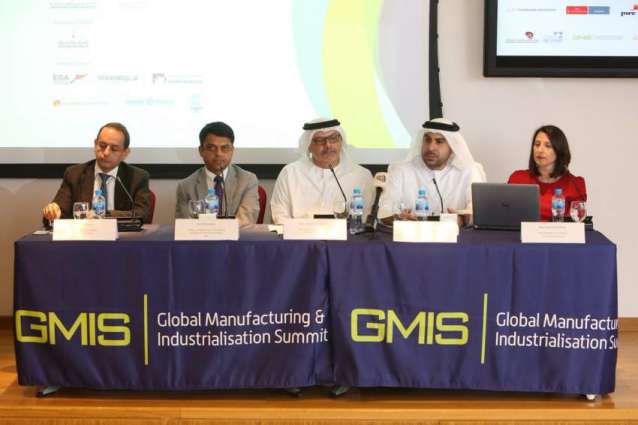The Fourth Industrial Revolution marks the age of connectivity and data-driven technology that is changing the world we live in.
GENEVA, (Pakistan Point News - 08th Oct, 2018) The Fourth Industrial Revolution marks the age of connectivity and data-driven technology that is changing the world we live in.
For the latest edition of the GMIS Connect Roadshow, held in Geneva, the Global Manufacturing and Industrialisation Summit, GMIS, partnered with the United Nations Industrial Development Organisation, UNIDO, and the International Telecommunication Union, ITU, the United Nations specialised agency for information and communication technologies, ICTs, to stress the need for a reliable and affordable ICT infrastructure to empower connectivity and advance Industry 4.0.
The Geneva edition of GMIS Connect brought together representatives from leading global organisations, national and international policymakers, global telecommunications firms and academic experts to discuss the importance of stakeholder alignment in shaping the future of ICT standards and infrastructure, and the critical role of internet connectivity in driving an inclusive and sustainable industrial development.
The ICT industry is undergoing rapid change. The advancement of connectivity and the emergence of the Internet of Things, IoT, is creating vast amounts of data that must be efficiently captured, processed and analysed enabling it to power decisions, products and even, cities. To enable this synergy, strategic cooperation and understanding between stakeholders is vital, especially as this new world has major economic, political and social implications for communities living in the age of smart technology.
As Namir Hourani, Managing Director of GMIS, said, "Undoubtedly, advances in information and communication technologies, ICT, and infrastructure as a whole, are the backbone of what is now known as the Fourth Industrial Revolution. However, without connectivity, none of the promises or benefits of the Fourth Industrial Revolution can be realised. We believe that today’s joint session with UNDIO, ITU and GMIS is the first step in our common endeavour to promote inclusive and sustainable industrial development."
The summit, a joint initiative between the United Arab Emirates the UNIDO, was established in 2015 to build bridges between manufacturers, governments and NGOs, technologists, and investors in harnessing the Fourth Industrial Revolution’s, 4IR, transformation of manufacturing, to enable the regeneration of the global economy.
During the Geneva event, experts in the "Stakeholder alignment for shaping the future of infrastructure and connectivity for inclusive and sustainable industrial development" panel debated methods to achieve global prosperity by enabling policies that bridge the digital divide, and the need to upscale digital infrastructure through multi-stakeholder partnerships in developing countries, and not just those living in developed societies.
In the second panel titled, "Technologies and innovations for sustainable smart cities and societies", participants discussed how the Sustainable Smart City and Society, SSCS, concept can harness advanced technologies for monitoring and optimising quality, performance, cost-effectiveness and resource consumption of services better than ever before, with particular emphasis on global standards and infrastructure that is needed in order to deliver seamless "smart technology".
"This Special Session opens the door to a new level of collaboration between ITU and UNIDO to help countries advance their industrialisation efforts, support the growth of SMEs, and bridge the digital divide," said Houlin Zhao, Secretary-General of ITU. "Investment in ICT infrastructure has never been more important. It is the cornerstone of today’s digital economy."
Coinciding with the session, PwC and GMIS launched an analysis report titled "The Future of Manufacturing – Switzerland". According to the new report, unveiled during the event, Switzerland is one of the most affluent countries in Europe with a GDP per capita of US$80,189 in 2017 and a population of just over eight million people. Characterised by its high export-orientation and ability to attract foreign investment, Switzerland is expected to gradually accelerate its economic growth to 2022.
Touching on the report, Badr Al-Olama, head of the GMIS organising committee said, "As the fourth industrial revolution evolves, a number of countries are emerging as pioneers, setting the course for a future of global prosperity. Switzerland is built on the foundations of a solid economy, forward-thinking government schemes and world-leading talent. It is therefore uniquely placed to become a leading example of manufacturing innovation and sustainable development for others to follow."
However, in the future, technological changes and globalisation will play an increasingly important role in shaping the course of the manufacturing sector. Therefore, to succeed and retain its strength in global manufacturing, the report suggested that countries such as Switzerland must recognise their unique capabilities and position themselves as early adopters of connectivity standards, promoting a unified framework for Industry 4.0 that capitalises on the unique value proposition of the country as an advanced manufacturing hub. The report suggests that the Swiss government must make efforts to support internationalisation efforts for Swiss SMEs by engaging in strategic partnerships, leveraging global platforms, and targeting new growth markets to grow and encourage the adoption of global ICT standards.
The discussions during the Geneva edition of GMIS Connect concluded with high-level meetings between the summit and the ITU where both parties conveyed their mutual interest to expand their collaborative efforts. "There are many shared objectives between our organisations, and we hope to formalise a joint framework with ITU before the end of this year," Hourani said.
GMIS Connect, the summit’s global roadshow programme aims to gather input and insights from key stakeholders all around the world that will contribute in forming the programme and agenda of the upcoming summit, which will take place in July 2019 in the city of Yekaterinburg, Russia. It will be themed on "nature-inspired technologies", highlighting the ways in which manufacturing is inspired by our surrounding environment and ecosystems. The summit will also discuss the importance of bridging the digital divide, focusing on the impact of the fourth industrial revolution on global economies, and the role of manufacturing in advancing the Sustainable Development Goals, SDGs, of the United Nations that will enable greater prosperity for our world.




